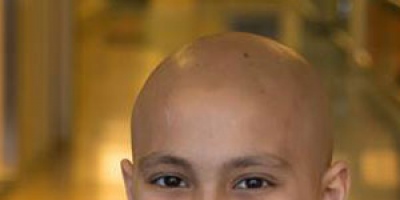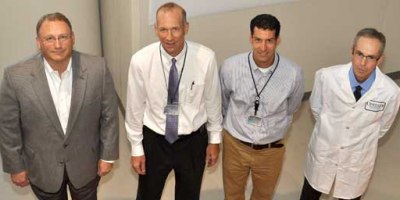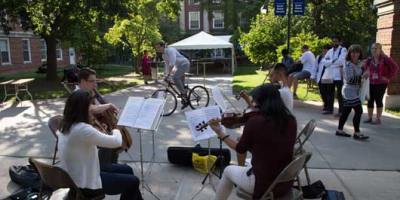Upstate brings international audience to Syracuse for kidney cancer symposium Sept. 24 to 26
SYRACUSE, N.Y.-- Upstate Medical University is bringing presenters and participants from across the globe to Syracuse for an international kidney symposium Sept. 24 to 26 to highlight the latest scientific discoveries and treatments for kidney cancer. The conference will take place the Genesee Grande Hotel, 1060 E. Genesee St.
Unlike most scientific conferences, the Upstate Kidney Symposium will provide a half-day session where patients with kidney cancers will have an opportunity to talk directly with the scientists and clinicians who are researching cures and providing care.
“We are breaking down the barriers that often exist between the scientist, clinician and patient, by bringing them together under one roof,” said Mehdi Mollapour, PhD., co-chair of the symposium organizing committee and a kidney cancer researcher at Upstate. “Bringing the scientific and medical communities together with patients extends our knowledge of the disease and treatments to the people who live with this illness everyday.”
Leading experts in the kidney cancer field, some from as far away as Japan, the United Kingdom, the Netherlands, Belgium and Canada, will present information on the new research and treatments. Sessions on kidney cancers will address surgical outcomes for patients, advanced treatment therapies and how to bolster anti-tumor immunity to kidney cancer.
Kidney or renal cancer is one of the ten most common cancers in men and women, though men are twice as likely to get kidney cancer. Warning signs may include blood in urine, low back pain on one side, mass or lump in lower back, among others.
Treatment options for kidney cancer may be more challenging than those for other cancers, as chemotherapy, one of the most traditional treatments for cancer, is generally not effective in treating kidney cancer.
“This is why scientists and clinicians gather at a conference such as this,” said symposium co-chair Gennady Bratslavsky, MD, professor and chair of Department of Urology at Upstate. “Everyday we are getting a step closer to finding new drugs that will target cancer cells in the kidney, enabling us to eradicate this cancer.” A research team at Upstate recently published in Cell Reports that a key cellular enzyme could be an effective drug target in kidney cancer cells.
W. Marston Linehan, MD, who pioneered the genetic basis of kidney cancer, will present the keynote address Thursday, Sept. 23 at 8:30 a.m. Linehan is chief of the Urologic Oncology Branch and senior investigator at the National Cancer Institute’s Center for Cancer Research in Bethesda, Md.
His research team identified the genes for the common forms of kidney cancer and described the pathways of these kidney cancer genes. His recent studies targeting the metabolic basis of kidney cancer have resulted in the regression of metastatic cancer in patients with type-1 and type-2 papillary kidney cancer.
As chief, Linehan oversees the Branch’s clinical/translational research program, which emphasizes new approaches to the therapies of genitourinary cancers, diagnostic and prognostic evaluation of solid genitourinary tumors, and the development of innovative surgical and adjunctive approaches to the treatment of patients with primary and metastatic urologic cancers of interest to Central New York Community. Four members of the Upstate's Department of Urology worked with Linehan at the National Institutes of Health and National Cancer Institute. They include Bratslavsky; Mollapour, who heads Upstate's Renal Cancer Biology Section; Srinivas Vorganti, MD, assistant professor of urology; and Dimitra Bourboulia, MD, head of the Bladder Cancer Biology Section.
Robert G. Uzzo, MD, professor and chairman of the department of surgery at Fox Chase Cancer Center in Philadelphia, will be the keynote speaker Friday, Sept. 25. Uzzo is recognized as a leader in the field of urologic oncology. His work focuses on treating kidney, prostate, testicular and bladder cancers, as well as procedures for urinary diversion. As a clinician, he specializes in minimally invasive procedures, including pure laparoscopic and robotic surgery for kidney, prostate and bladder cancers.
The Upstate Kidney Cancer Symposium is partnering this year with the BHD Symposium, which was held last in 2013 at the Ecol du Louvre in Paris.
BHD is short for Birt-Hogg-Dubé syndrome, a hereditary condition associated with multiple noncancerous (benign) skin tumors, lung cysts, and an increased risk of both benign kidney tumors and kidney cancer. Symptoms of BHD generally do not appear until adulthood. Patients with BHD are expected to attend the symposium.
Mallopour said, “the opportunity for the symposium to come to Syracuse, attract participants from overseas and showcase the latest findings in kidney cancer research is somewhat of a coup.”
This conference previously was held in Denmark, Washington, D.C., the Netherlands, Cincinnati and Paris.
“This symposium helps put Syracuse on the map as a location where outstanding medical research and surgeries are being done, and reflects well on the reputation that Upstate is building in the area of kidney cancer research and treatment,” said Mollapour, noting that financial support for the conference has come from 10 major sponsors.





